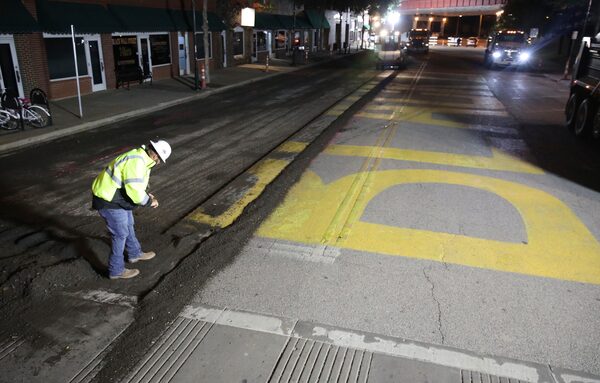
Tulsa city workers remove a Black Lives Matter street painting on Oct. 5, 2020, from the site of the 1921 Race Massacre, one of the nations worst episodes of racial violence, in Tulsa, Okla.MIKE SIMONS/The Associated Press
The city of Tulsa removed a massive Black Lives Matter painting on Monday from the site of the 1921 Tulsa Race Massacre after activists painted it without the city’s permission.
The 250-foot-long (76.20 metres) sign was painted days before President Donald Trump’s June rally and weeks after George Floyd’s death in May after a Minneapolis police officer pressed his knee on the neck of the handcuffed Black man for several minutes.
The race riot in 1921 decimated Tulsa’s Black Wall Street, an economic and cultural mecca for African American people, which was located in the Greenwood neighbourhood. The violence left 300 dead, 800 wounded and more than 8,000 homeless.
Terry Ball, streets and stormwater director, said work to remove the sign began about 4:15 a.m. The sign was gone within about two hours, the Tulsa World reported.
The street was scheduled for maintenance next spring, but the project was moved up to remove the mural at no additional cost to the city. Ball said he expects the project to be completed Monday.
C.J. Weber-Neal, president of the Greenwood Arts and Cultural Society, said it’s a “sad day” in Tulsa. He arrived at the work site early in the morning.
“I think they did it early because they knew there was going to be resistance to this,” Weber-Neal said. “They felt that the only way that they were going to be able to do this without anybody forming protests or things was to come out here and do this early.
While the sign was up, it was vandalized with a streak of blue paint, which moved volunteers in the community to repaint it.
Mayor G.T. Bynum has said he supports the sign’s message but cannot support keeping it on a city street.
“I fully support the display of this message on private property, as has already been done without controversy in a number of locations around the city,” Bynum said Friday.
After exploring options to keep the sign, city councillors determined it could not be done without facing legal challenges and encouraging more people to paint city streets.
Vanessa Hall-Harper, Tulsa’s only Black councillor, said last week the city had caved to pressure from bigots and racists.
“And so Tulsa is the only major city in this country that said we have to remove it, as opposed to standing on the right side of history and saying, ‘This issue was more important than that,’” Hall-Harper said.
The road is expected to reopen as early as Wednesday.
This content appears as provided to The Globe by the originating wire service. It has not been edited by Globe staff.